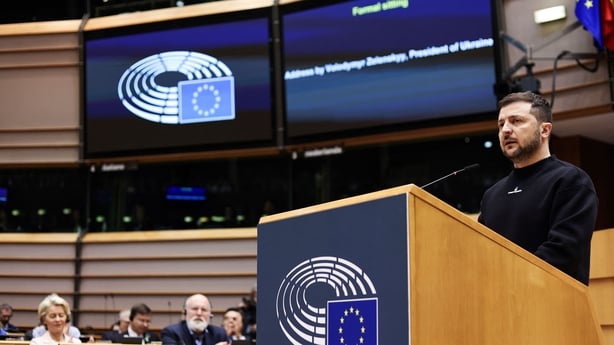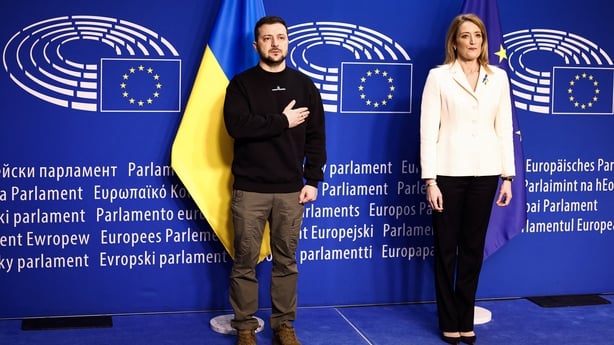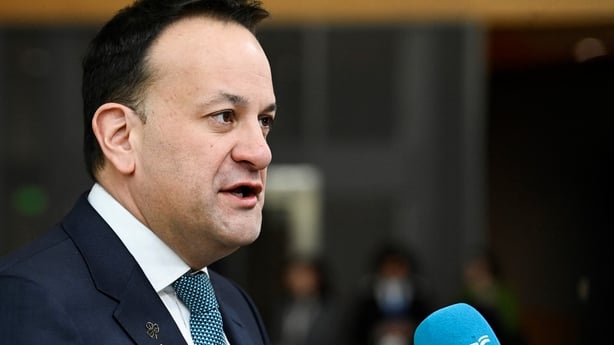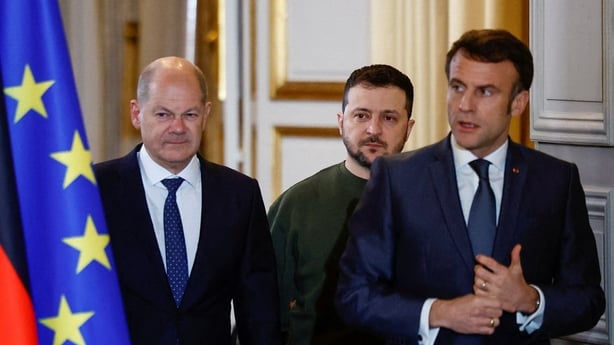Ukrainian President Volodymyr Zelensky has indicated that several European Union member states are ready to provide fighter jets to his country to help the fight against Russia's invasion of his country.
He made the comments at a news conference in Brussels after he joined an EU summit there.
Mr Zelensky gave no further details about the pledges, and there was no immediate confirmation from any European countries, but his remarks could indicate one of the biggest shifts yet in Western military support for Ukraine.
"Europe will be with us until our victory. I've heard it from a number of European leaders ... about the readiness to give us the necessary weapons and support, including the aircraft.
"I have a number of bilaterals now, we are going to raise the issue of the fighter jets and other aircraft," he said.
Moments earlier, Mr Zelensky's chief of staff, Andriy Yermak, posted on social media: "The question of long-range weaponry and fighter jets for Ukraine has been resolved."
"Details still to follow," he added.

Western countries that have provided Ukraine with arms have so far refused to send war planes or long-range weapons capable of striking deep inside Russia.
But there have been signs that this stance could be lifted during Mr Zelensky's European tour, which began yesterday with a visit to London and Paris.
UK Prime Minister Rishi Sunak promised to train Ukrainian pilots to fly advanced NATO fighter jets, although he stopped short of offering to supply the planes.
Mr Zelensky said his country together with Europe was "defending ourselves against (the) biggest anti-European force of the modern world".
In an address to the European Parliament, he gave thanks for the help that Ukraine has been receiving from the EU to defend itself against the Russian invasion.
MEPs gave him a standing ovation, cheering and applauding, some of them wearing the blue and yellow colours of the Ukrainian flag.
"We are defending ourselves in the battlefield, we Ukrainians, together with you," he said.
"We are defending ourselves in the battlefield, we Ukrainians, together with you"
— RTÉ News (@rtenews) February 9, 2023
Ukrainian President Volodymyr Zelensky has said his country together with Europe is "defending ourselves against (the) biggest anti-European force of the modern world" | https://t.co/PDrJ9lCWLv pic.twitter.com/h30EGeFDer
European Parliament chief Roberta Metsola backed Ukraine's call for more weapons.
"We know the sacrifice your people have endured for Europe and we must honour it not only with words but with action," she said, adding that this should include "the jets you need to protect the liberty too many have taken for granted".

EU foreign policy chief, Josep Borrell, reaffirmed to reporters as he arrived for the summit that the European Union will deliver more military support to Ukraine.
Ukrainian officials are also pushing for membership talks within months.
But while some EU member countries are keen to give Ukraine the morale boost that would come with starting talks to join the bloc, others are much more cautious. They have stressed would-be members need to meet a range of criteria - such as cracking down on corruption - before they can even start negotiations
Ukraine became a candidate to join the EU last June but the process of joining the 27-nation bloc takes several years.
Earlier, Taoiseach Leo Varadkar said he believed that negotiations on EU accession for Ukraine could begin by the end of the year.
Speaking as he arrived at the summit, he said: "Obviously, Ukraine has to meet the criteria. But we've all been enormously impressed about how the Ukrainian government and the Ukrainian people are doing everything they can to meet the test of membership.

"I don't think we should dilute those tests but if Ukraine satisfies the criteria for membership, then we should advance their application."
Mr Varadkar said the fact that Ukraine is partly occupied by Russia should not be a cause to hold up accession talks, referring to Cyprus as an EU member state where part of its territory was not under its control.
The Taoiseach is expected to meet President Zelensky when he holds talks with small groups of EU leaders.
He told reporters: "This is an opportunity for us as Europeans to say that we stand 100%, behind Ukraine. We will stand with Ukraine until Ukraine has peace again, and achieved a lasting peace. That means Russia withdrawing, and it means Ukraine being allowed to continue on its democratic and European path."
Ireland would not change its position regarding only sending non-lethal support to Ukraine, he added.
Mr Varadkar said: "Ukraine is seeking military aid from other European countries, particularly Germany, particularly France. We don't have fighter jets, or tanks or heavy weapons. Even if we wanted to, it would be against our policy of neutrality."
He said Ireland was supporting Ukraine in financial and humanitarian ways, as well as sending body armour.

Mr Zelensky's appearance in Brussels had been leaked earlier this week causing something of a security headache.
But he is using his appearance at the summit to press for an early decision by the EU to begin accession negotiations as soon as possible.
Mr Zelensky is on record as saying the decision should be taken later this year, but member states are divided over how quickly to accelerate the process of Ukraine's accession.
Leaders will also address the alarming rise in irregular immigration into the EU from Africa and the Middle East, with officials saying numbers are close to what they were in the massive migration surges in 2015 and 2016.
While Italy and Greece once again complain that they are struggling, as front line states, to cope with such huge numbers, there is little prospect that other member states will agree to share the burden.
That means the focus will be on strengthening the EU's external borders, with the possibility that leaders could approve the use of EU funding to build a fence on the Bulgarian-Turkish border.
Leaders will also start the debate on how Europe should respond to the Biden Administration pouring hundreds of billions of dollars into the green tech industry, a move which prompted some member states to argue for Europe to relax the rules to allow governments to massively subsidize European industry.
The council will also discuss the issue of migration, including working closely with countries of origin and transit to better manage entries, increase returns where appropriate and to disrupt traffickers.
All Member States, including Ireland, are experiencing increased numbers of migrants arriving at a time when we are also hosting large numbers fleeing the war in Ukraine.
Additional reporting Reuters







